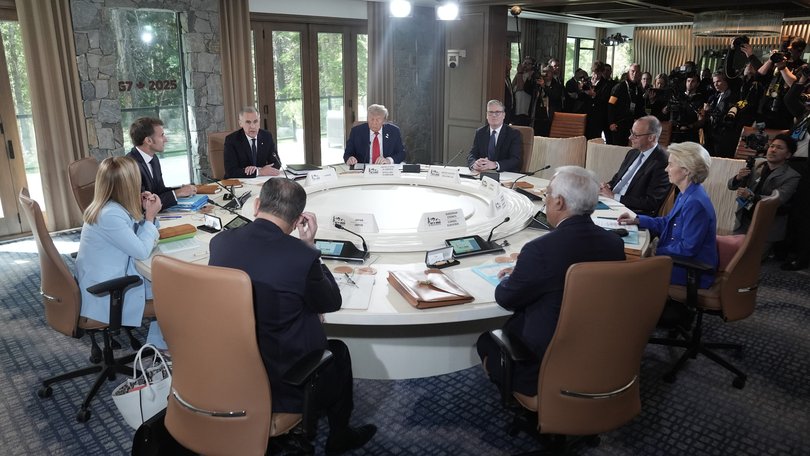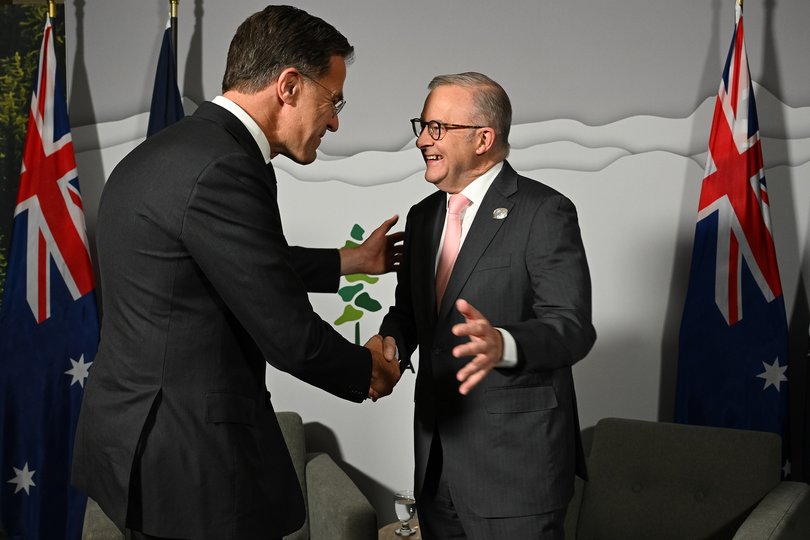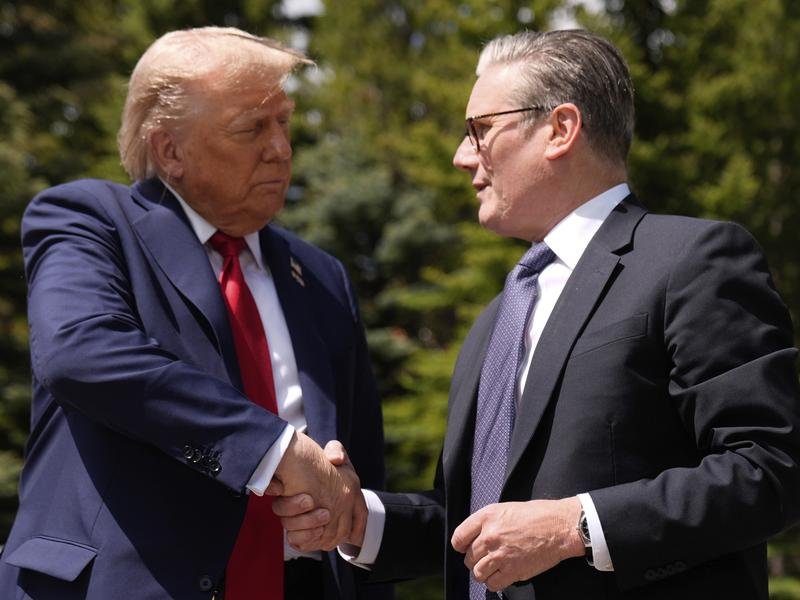ELLEN RANSLEY: Albanese urged to book Washington DC visit after US President Donald Trump leaves G7 early
ELLEN RANSLEY: Anthony Albanese has lost a critical chance to plead Australia’s case on tariffs and AUKUS to Donald Trump, after the United States President left the G7 summit early. What will he do now?

Anthony Albanese has lost a critical chance to plead Australia’s case on tariffs and AUKUS to Donald Trump, after the United States President left the G7 summit early to deal with the escalating Israel-ran crisis.
Just minutes after wrapping up a press conference where the Prime Minister said he was looking forward to his meeting with Mr Trump, Mr Albanese was blindsided by a tweet by US Press Secretary Karoline Leavitt announcing the President would be returning to Washington.
In doing so, leaders’ meetings with Australia, Ukraine, South Korea, Mexico, and India were canned.
Sign up to The Nightly's newsletters.
Get the first look at the digital newspaper, curated daily stories and breaking headlines delivered to your inbox.
By continuing you agree to our Terms and Privacy Policy.It was a possibility Australia had been alive to, and a spokesperson for Mr Albanese said Mr Trump’s early departure was “understandable” given what is happening in the Middle East.
Labor won’t call the trip a waste, with the PM to forge ahead with his other scheduled meetings, including with various European leaders, Japan, and British PM Keir Starmer, on top on those he’s had with leaders of Canada, Korea, and NATO.
But Mr Albanese’s first face-to-face meeting with Mr Trump was the most highly anticipated of those he had organised for the sidelines of the summit - of which Australia is not a member but was invited to attend by Canadian PM and host Mark Carney.
Mr Trump’s decision is less a snub, and more a harsh reality check that against a backdrop of potentially escalating war, we are small fry.
As understanding as the Government may be, the President’s early exit now makes Mr Albanese’s task of building a personal, leader-to-leader relationship with Mr Trump that much harder.
He will return home to fierce political pressure to get to Washington as soon as possible.
Mr Albanese was not expecting to walk away from the scheduled meeting with the steel and aluminium tariffs issue resolved, but it would have marked a crucial step in the long road to trying to get the President to drop the levies.
The fact that the Canadian and UK leaders walked away from their meetings on Monday (local time) with Mr Trump with something to show for it is proof that these things take time.
There is an open invite for the President to visit Australia, but Mr Trump has yet to extend an offer to Mr Albanese to visit him in the White House.
It appears that unless anything changes, the next opportunity for the pair to meet won’t be until September, when the PM is expected to visit the US to address the United Nations General Assembly in New York.
But given the lingering uncertainty around AUKUS amid a snap Pentagon review, and the US showing no signs of winding back its tariffs, the Coalition says Mr Albanese cannot afford to wait so long and should have already made the effort to fly to Washington in the last five months.
Opposition Leader Sussan Ley lambasted the PM for not being more proactive in attempting to meet the President face-to-face.
“The Albanese Government should not have merely relied on meeting with the President on the sidelines of international summits,” she said.
“The Prime Minister should have been more proactive in seeking to strengthen this relationship - Australia’s most important - and we encourage him to change his approach to advance our national interest.”

Trade spokesman Kevin Hogan said Mr Albanese “must provide assurances on what his plan is now to ensure he gets a face to face meeting with President Trump”.
Foreign Minister Penny Wong stressed that Australia was not the only country whose bilateral meeting was cancelled, and called on the Opposition to “back Australia”.
“We know that we speak very strongly as a country when we speak together,” she said.
As for whether Mr Albanese should prioritise an urgent trip to Washington, Senator Wong said the Midle East conflict was clearly going to take up a fair chunk of Mr Trump’s time for the foreseeable future.
Deputy Prime Minister Richard Marles said he was sure that “in the not too distant future, they will meet face to face”.
“We have seen the Prime Minister and the President have a number of phone calls to date, they are building a rapport,” he said.
“We feel very confident about where the relationship is going with the Trump Administration. We understand the circumstances at this moment, and I’m sure that in the not too distant future, you’ll see a meeting between the two leaders.”
Without getting a chance to make the case to Mr Trump himself that AUKUS is in the US’ best interests, Mr Albanese will have to hope that the President’s ambiguous agreement with UK PM Keir Starmer - who said AUKUS was “really important” to both the US and the UK - is a strong enough endorsement to lead the trilateral deal through the Pentagon’s snap review.

During their bilateral meeting, Sir Keir said the probe “makes good sense to me, but (AUKUS) is a really important deal”.
Mr Trump said: “We’re very long-time partners and allies and friends, and we’ve become friends in a short period of time”.
That could be inferred as an assessment on the US-UK alliance rather than the AUKUS partnership, but nevertheless Mr Albanese was upbeat.
“It was very positive,” he said.
“Of course it is in Australia, the United States and the United Kingdom’s interest that AUKUS not just proceed in terms of Pillar I, but Pillar II as well. There are great advantages that we have.”
The PM was to argue directly to the President that the partnership would bolster American industry and ensure the US maintained a critical Indo-Pacific presence in Australia. So too could he have made his pitch about Australia’s defence spending, which falls well short of what Washington want.
He’d even sought the advice of Greg Norman, whose close relationship with Mr Trump was pivotal during the last Trump administration.
Mr Albanese is still set to meet with Sir Keir. It could be an opportunity for the pair to talk tactics on keeping the US on side with AUKUS, as well as on how the UK secured a carveout from the President’s tariffs.
Under a US-UK agreement signed in Canada on Monday (local time), tariffs on the British auto industry would be lowered - from 25 per cent to 10 per cent for the first 100,000 cars, while levies on the UK aerospace sector would be removed.
In the order signed by Mr Trump, the US said it would set up a similar system for steel and aluminium, that is currently subject to 25 per cent tariffs, but did not specify what it would be.
In response to a question about future tariffs, Mr Trump said the UK was “very well protected”. “You know why? Because I like them,” he added.
Before his own meeting with the President was cancelled, Mr Albanese had tried to temper expectations that he would walk away with a deal.
“I don’t think it would be reasonable to expect that you would have a … complete resolution of the issues,” he said .
Nevertheless, a meeting with the President would have been an important step to any potential final resolution.

